Selecting appropriate baggage can impact your travels. Not only can it affect your experience. But it can also impact how much you enjoy your trip. In this article, we’ll cover everything you need to know to select the perfect luggage. Especially for your next adventure. From the different types of luggage available to important features and considerations. we’ll give you all the information you need to make an informed decision. Regardless of whether you’re embarking on a brief weekend escape. Or an extended voyage. Read on to learn how to choose the right luggage for your trip.
Factors to Consider When Choosing Luggage
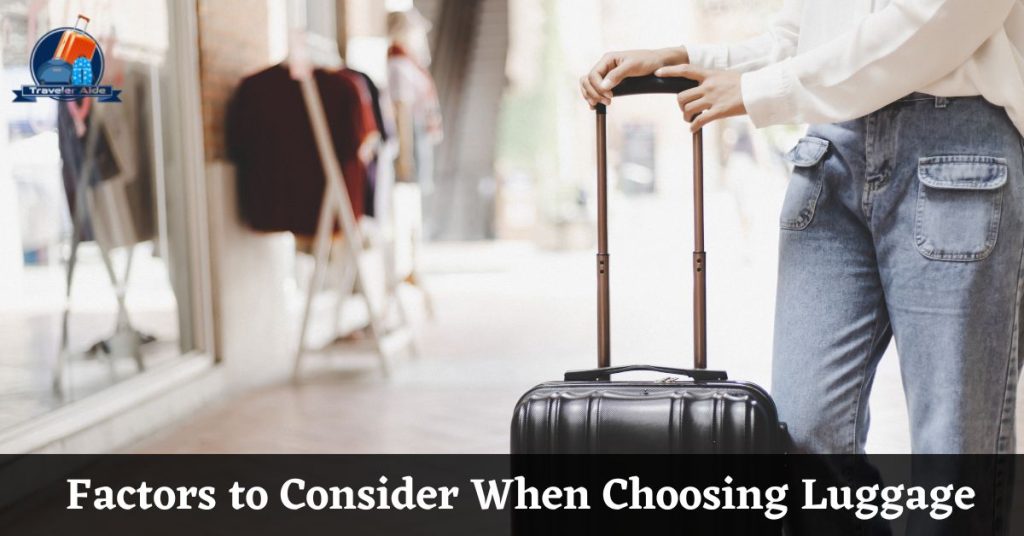
Choosing the right luggage for your trip requires considering various factors. To ensure your belongings are safe and secure. Here are some significant points to remember:
A. Type of trip:
The type of trip you’re embarking on will determine the type of luggage you need. For instance, a backpack may be more suitable for a camping trip. While a wheeled luggage may be more appropriate for a business trip.
B. Length of trip:
The length of your trip will also play a significant role in selecting your luggage. A shorter trip may only need a carry-on, while a longer trip may need a larger suitcase.
C. Transportation mode:
Your mode of transportation will also influence your luggage choice. If you’re traveling by plane, you’ll need to consider size and weight restrictions. While if you’re taking a road trip, you may be able to pack a larger suitcase.
D. Luggage size:
The size of your luggage should be proportionate to the length of your trip. And the mode of transportation. It’s essential to choose a size that will accommodate all your belongings. Without being too bulky or heavy.
E. Luggage weight:
Consider the weight of your luggage, especially if you’re traveling by plane. Airlines often have weight restrictions, and exceeding them can result in extra fees.
F. Luggage material:
The material of your luggage can affect its durability, weight, and water resistance. Common materials include polyester, nylon, and hard-shell plastic.
G. Luggage features:
Look for luggage with features that will make your trip easier. Such as many compartments, wheels, and lockable zippers.
H. Budget:
Finally, consider your budget when selecting your luggage. You can find quality luggage at various price points. So it’s essential to find one that fits your needs and budget.
Types of Luggage
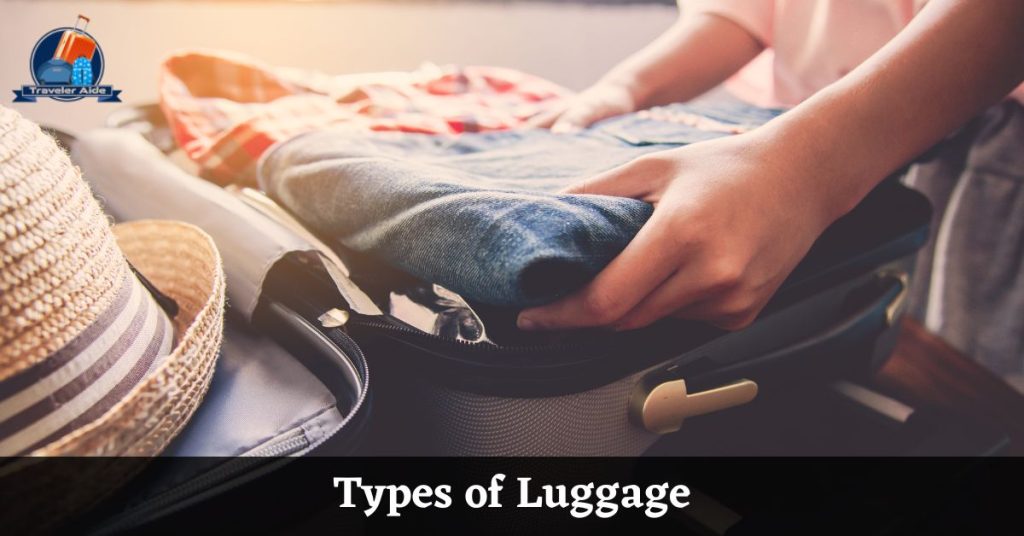
A. Carry-On Luggage
Advantages:
- Convenient for short trips or weekend getaways
- Saves time and money by avoiding checked bag fees and waiting at baggage claim
- Easier to maneuver and store in overhead compartments and good for student
Disadvantages:
- Limited space and may not fit all necessary items for longer trips
- Strict size and weight restrictions on airlines
- Can be uncomfortable to carry for long periods of time
Appropriate use cases
- Short trips or weekend getaways
- Traveling with only essential items
- Avoiding checked bag fees and waiting at baggage claim
B. Checked Luggage
Advantages:
- Can hold more items and larger items that cannot fit in carry-on luggage
- No need to worry about size and weight restrictions as it used as checked bags
- Can be checked in and not carried throughout the airport
Disadvantages:
- Higher risk of loss or damage
- Long waiting times at baggage claim
- Extra fees for overweight or oversized luggage
Appropriate use cases
- Longer trips or trips with more items needed
- Traveling with items that cannot fit in carry-on luggage
- Flying with an airline that includes checked luggage in the ticket price
C. Backpacks
Advantages:
- Easy to carry and maneuver
- Can be used as both luggage and a daypack for excursions
- Hands-free and allows for mobility
Disadvantages:
- Limited space and may not be suitable for long trips or bulkier items
- Can cause back and shoulder strain if not fitted and packed
- Not as secure as traditional luggage
Appropriate use cases
- Outdoor adventures or hiking trips
- City travel or backpacking
- Traveling with only necessary items
D. Duffel Bags
Advantages:
- Can hold a lot of items and is flexible in packing
- Easy to store and transport when empty
- Can be used as both luggage and a gym bag
Disadvantages:
- Limited organization and can be difficult to find items
- Not as secure as traditional luggage
- Can be uncomfortable to carry for long periods of time
Appropriate use cases
- Sports or gym activities and put on rack like luggage
- Road trips or car travel
- Traveling with items that do not need careful organization or protection
Luggage Features to Consider
A.Size and Capacity
- Importance of choosing the appropriate size
- When choosing luggage, it’s important to consider the size of the bag and how much it can hold. It’s essential to select luggage that’s appropriate for the length. And the type of trip you’ll be taking. Too small of a bag will leave you without enough space for all your belongings. While a bag that’s too large will be cumbersome to carry around.
- Capacity considerations for different types of luggage
- The capacity of your luggage will depend on the type of bag you choose. Carry-on bags will typically hold less than checked luggage. While backpacks and duffel bags can vary in size and capacity.
B. Durability
- Materials to consider
- When selecting luggage, it’s important to consider the durability of the materials used. Look for materials that can withstand wear and tear. Such as high-denier nylon or polyester, ballistic nylon, or polycarbonate.
- Durability features to look for
- Besides durable materials, consider luggage with reinforced corners. Strong zippers, and double-stitching to enhance durability.
C. Weight
- Importance of choosing lightweight luggage
- The weight of your luggage can impact your ability to maneuver. Through airports or travel to your destination. Choosing lightweight luggage can make traveling more comfortable and prevent potential injuries.
- Factors that impact the weight of luggage
- The weight of luggage can be affected by the materials used. The size of the bag, and extra features like wheels or handles. When choosing luggage, consider the weight of the empty bag. So you have a better understanding of how much weight you can add with your belongings.
D. Organization
- Importance of staying organized while traveling
- Staying organized while traveling can make your trip more comfortable and efficient. Having a designated place for your belongings can prevent you from losing items. And make it easier to access what you need.
- Luggage features that can aid in organization
- Look for luggage with many compartments, and packing cubes. or mesh pockets that can help you separate and organize your belongings. Additionally, luggage with compression straps can help you maximize space. And keep your items secure during transit.
Extra Considerations
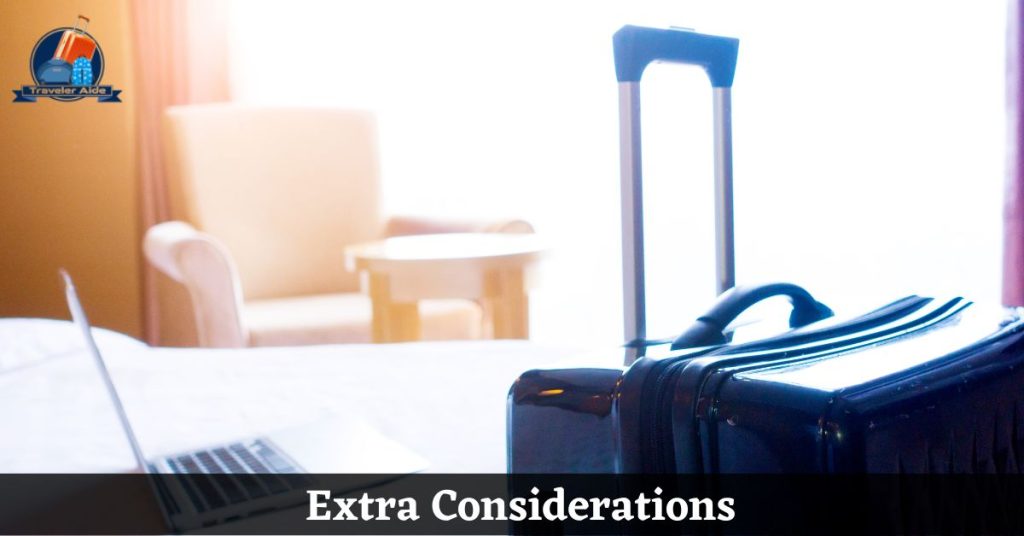
A. Transportation Considerations
When selecting the right luggage for your trip. It’s important to consider the different modes of transportation you may be using. Depending on the type of transport you will use. You’ll need to make sure that your luggage is equipped with features. That aid in its mobility and convenience. For air travel, pick a lightweight bag with wheels or an easy-to-carry backpack. This can help reduce the strain of carrying too much weight. When walking through airports or navigating busy terminals. Additionally, look for a bag that is approved as carry-on luggage by airlines. And meets size requirements for overhead bin storage. If you are traveling by car, select a duffel bag or suitcase with plenty of compartments.
And pockets for organization and space to store bulky items like jackets or blankets. Also, make sure the bag fits in your vehicle so your items don’t move around during transit. For train travel, consider a lightweight and waterproof bag. That can be stored away without taking up too much space. Additionally, look for bags with straps or handles that allow you to hang them from hooks above your seat. Or place them underneath the seat. Finally, if you’re going on a hiking or camping trip. Opt for a secure backpack with adjustable straps. And plenty of pockets for organization. Look for features like water resistance and weatherproofing materials. To protect your belongings from the elements.
B. Security
When selecting luggage, it’s important to consider security features like luggage lock. That can help protect your belongings while traveling. Look for hard-sided luggage with built-in locks or combination locks. That are TSA approved to keep your belongings safe during air travel. Additionally, look for bags with RFID-blocking compartments and zipper pulls. Which can help prevent the theft of personal information from contactless identification. Cards like passports or credit cards. Bags with anti-theft straps and backpacks with inner pockets. Can also help protect your items from potential pickpockets. Finally, when packing for a trip, it’s important to use tamper-proof sealing methods. Like zip ties to make sure the contents of your luggage stay secure.
Video on How To Choose The Right Luggage For Your Trip
Conclusion
Choosing the right luggage for your trip is an important decision. That can make or break a successful journey. Consider factors such as weight, and organization. And security to ensure you select the best bag for your needs. Additionally, research different transportation options and look for features. Like wheels or adjustable straps that help with mobility and convenience. With these tips in mind, you can make sure your trip is stress-free and enjoyable. More resources for more information on how to pick the right luggage for your trip. Hope you understand how to choose the right luggage for your trip in this post.
Hi there! I’m a Travel Advisor, and I’m a seasoned traveler with a passion for exploring new and exciting destinations. I have visited the heritage sites of several countries and have learned a thing or two about traveling the world in style and comfort.
My expertise lies in finding the perfect balance between luxury and adventure, and I’m always on the hunt for new and unique experiences. I believe that travel should be about creating meaningful connections and cultural exchanges, and I strive to make a positive impact wherever I go.
With 15 years of experience in the travel industry and a wealth of knowledge about destinations near and far, I’m confident in my ability to help plan the perfect trip for any type of traveler. Whether you’re looking for an exotic beach getaway, a bustling city escape, or an adventure-filled road trip, I’ve got you covered.

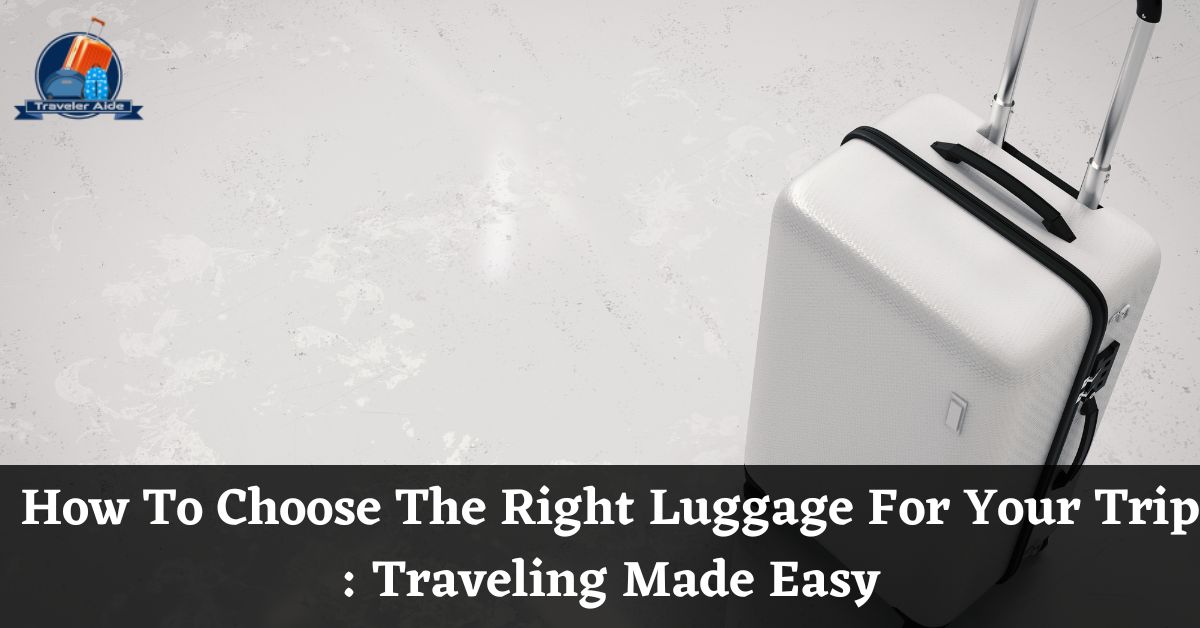
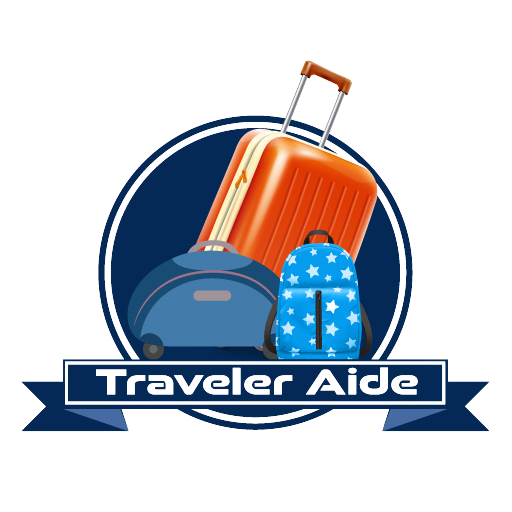
2 thoughts on “How To Choose The Right Luggage For Your Trip : Traveling Made Easy”